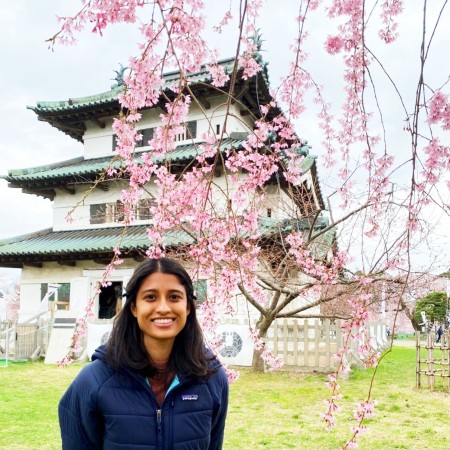21 May 2021
Engineer Making Sustainable Changes in Japan Inspired By UCSD Extension Certificate
By Felicia Campbell
[3-minute read]
 Abhilasha Devaraj could be best described as a global citizen. An Indian national who grew up in Japan, she moved with her family to San Diego when she was 11-years-old. Abhilasha went on to earn her undergraduate degree in Environmental Engineering at UC San Diego. Then she returned to Japan for her master's in engineering and began her professional life as an engineer at Toyota in Tokyo.
Abhilasha Devaraj could be best described as a global citizen. An Indian national who grew up in Japan, she moved with her family to San Diego when she was 11-years-old. Abhilasha went on to earn her undergraduate degree in Environmental Engineering at UC San Diego. Then she returned to Japan for her master's in engineering and began her professional life as an engineer at Toyota in Tokyo.
Abhilasha knew early that she wanted to help reduce pollution globally and create a sustainable lifestyle that enables people to live in a better, healthier environment. Her diverse life experiences and travels gave her a unique perspective on the effects of environmental changes caused by human factors. Through her studies, she decided that her ultimate career goal was to help promote climate control. She had always approached this goal from the scientific side of things, but after she began working, she discovered unexpected challenges to advancing sustainability efforts.
"I had been working in advanced research and development for hybrid battery technology for three years when I realized I needed to learn about the business of sustainability if I wanted to make decisions that could make a real difference," she explained. "Even though I was working for a company that pioneered hybrid vehicle technology, I wanted the opportunity to push sustainability even further."
Electric vehicles are leaps and bounds better for the environment than traditional vehicles, but fresh off the assembly line, electric vehicles have a much larger carbon footprint, largely because of battery technology. So if she could work on making parts of that process more environmentally friendly, it would have a huge impact on the future of the industry.
When she started looking into education options, she realized that she didn't have any geographic restrictions, thanks to online learning. After some online research, she found a continuing education program that addressed all her needs with the Sustainable Business Practices certificate at UC San Diego Extension.
"I've always studied or worked in engineering, so I already had the science knowledge, but I had no background in business or economics, and this program offered all of that. I was able to learn various aspects of business decisions, things like how to calculate the cost-savings of sustainable choices, which allowed me to make stronger business cases," she said. "I chose classes that were all online and with just one class per quarter. Extension made it easy to manage work, school and personal life."
One class, in particular, helped her to see the issues of sustainability in Japan in a new light and ultimately led to a career change.
"My favorite class was Conservation Psychology. It had an interesting approach to something I'd never heard of. I never took a psych class in undergrad, and it made me realize how key it is to convince people of the importance of practicing sustainability," she said. "Japan is a plastic-loving country because plastic is cheaper, and as part of the cultural history, quality control is so important, which is why they wrap everything in plastic. Many think that because we separate garbage and recycling, they are living in a sustainable way. But we don't recycle plastic; it is burned."
Abhilasha was inspired to shift her focus to overcoming cultural and infrastructure hurdles to reducing plastic and packaging waste in Japan, and she accepted a position as a process engineer at Amazon.
"It is a totally different industry from working on hybrid battery technology to packaging, but I feel like I have so much more freedom. I gained the knowledge to be able to design and run experiments and then to actually work with local fulfillment centers on implementation," she said. "Our goal is to ship without creating more waste. We can't get rid of all boxes, but we can work on package downsizing and reducing the wasted space in the boxes that go out. Instead of flex packages, which use lots of plastic, we are switching to paper, and we are using machine learning to look at customer shipment sizes to optimize the box sizes."
She hopes these changes are the first step towards a larger cultural shift away from plastic.
"More people began using Amazon in Japan during Covid, and maybe our packaging strategies will help people to see that plastic wrapping is not needed to preserve quality. Maybe our work at Amazon will get people to start thinking differently about plastic waste and slowly change their habits."
No matter the industry, she feels that anyone committed to improving the sustainability of their workplace would benefit from specialized education at UC San Diego Extension.
"If you are thinking about how you can start making business decisions based on sustainability facts, I highly recommend this extension program."
Learn more about the Sustainable Business Practices certificate program on our website.